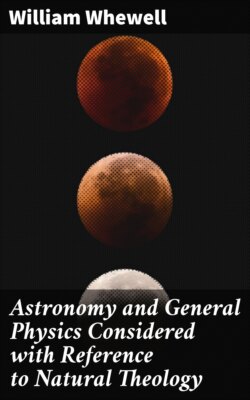Читать книгу Astronomy and General Physics Considered with Reference to Natural Theology - William Whewell - Страница 4
На сайте Литреса книга снята с продажи.
ОглавлениеCHAPTER III.
Mutual Adaptation in the Laws of Nature.
Table of Contents
To ascertain such laws of nature as we have been describing, is the peculiar business of science. It is only with regard to a very small portion of the appearances of the universe, that science, in any strict application of the term, exists. In very few departments of research have men been able to trace a multitude of known facts to causes which appear to be the ultimate material causes, or to discern the laws which seem to be the most general laws. Yet, in one or two instances, they have done this, or something approaching to this; and most especially in the instance of that part of nature, which it is the object of this treatise more peculiarly to consider.
The apparent motions of the sun, moon, and stars have been more completely reduced to their causes and laws than any other class of phenomena. Astronomy, the science which treats of these, is already a wonderful example of the degree of such knowledge which man may attain. The forms of its most important laws may be conceived to be certainly known; and hundreds of observers in all parts of the world are daily employed in determining, with additional accuracy, the arbitrary magnitudes which these laws involve.
The inquiries in which the mutual effects of heat, moisture, air, and the like elements are treated of, including, among other subjects, all that we know of the causes of the weather (meteorology) is a far more imperfect science than astronomy. Yet, with regard to these agents, a great number of laws of nature have been discovered, though, undoubtedly, a far greater number remain still unknown.
So far, therefore, as our knowledge goes, astronomy and meteorology are parts of natural philosophy in which we may study the order of nature with such views as we have suggested; in which we may hope to make out the adaptations and aims which exist in the laws of nature; and thus to obtain some light on the tendency of this part of the legislation of the universe, and on the character and disposition of the Legislator.
The number and variety of the laws which we find established in the universe is so great, that it would be idle to endeavour to enumerate them. In their operation they are combined and intermixed in incalculable and endless perplexity, influencing and modifying each other’s effects in every direction. If we attempt to comprehend at once the whole of this complex system, we find ourselves utterly baffled and overwhelmed by its extent and multiplicity. Yet, in so far as we consider the bearing of one part upon another, we receive an impression of adaptation, of mutual fitness, of conspiring means, of preparation and completion, of purpose and provision. This impression is suggested by the contemplation of every part of nature; but the grounds of it, from the very circumstances of the case, cannot be conveyed in a few words. It can only be fully educed by leading the reader through several views and details, and must grow out of the combined influence of these on a sober and reflecting frame of mind. However strong and solemn be the conviction which may be derived from a contemplation of nature, concerning the existence, the power, the wisdom, the goodness of our Divine Governor, we cannot expect that this conviction, as resulting from the extremely complex spectacle of the material world, should be capable of being irresistibly conveyed by a few steps of reasoning, like the conclusion of a geometrical proposition, or the result of an arithmetical calculation.
We shall, therefore, endeavour to point out cases and circumstances in which the different parts of the universe exhibit this mutual adaptation, and thus to bring before the mind of the reader the evidence of wisdom and providence, which the external world affords. When we have illustrated the correspondencies which exist in every province of nature, between the qualities of brute matter and the constitution of living things, between the tendency to derangement and the conservative influences by which such a tendency is counteracted, between the office of the minutest speck and of the most general laws; it will, we trust, be difficult or impossible to exclude from our conception of this wonderful system, the idea of a harmonizing, a preserving, a contriving, an intending Mind; of a Wisdom, Power, and Goodness far exceeding the limits of our thoughts.
